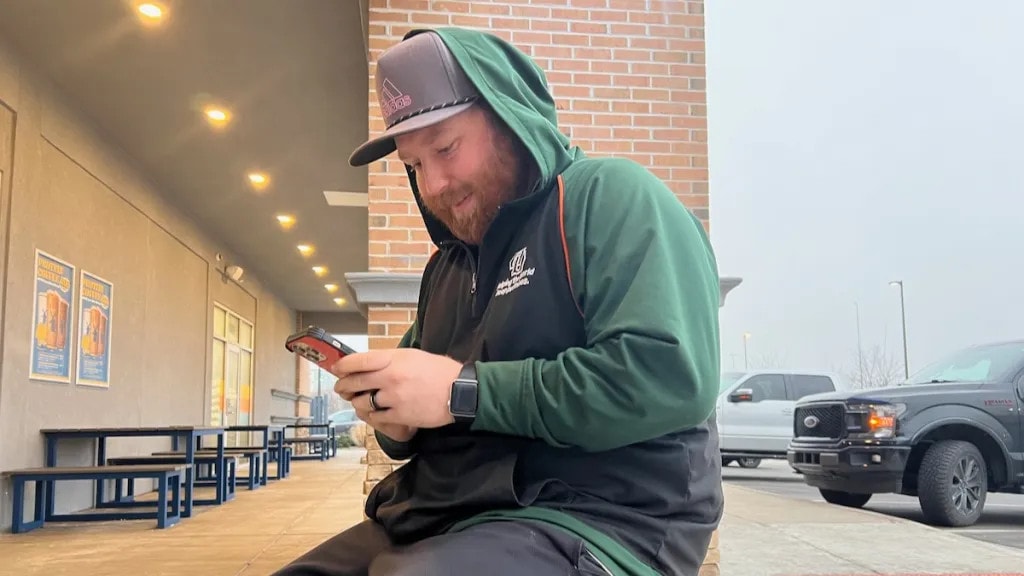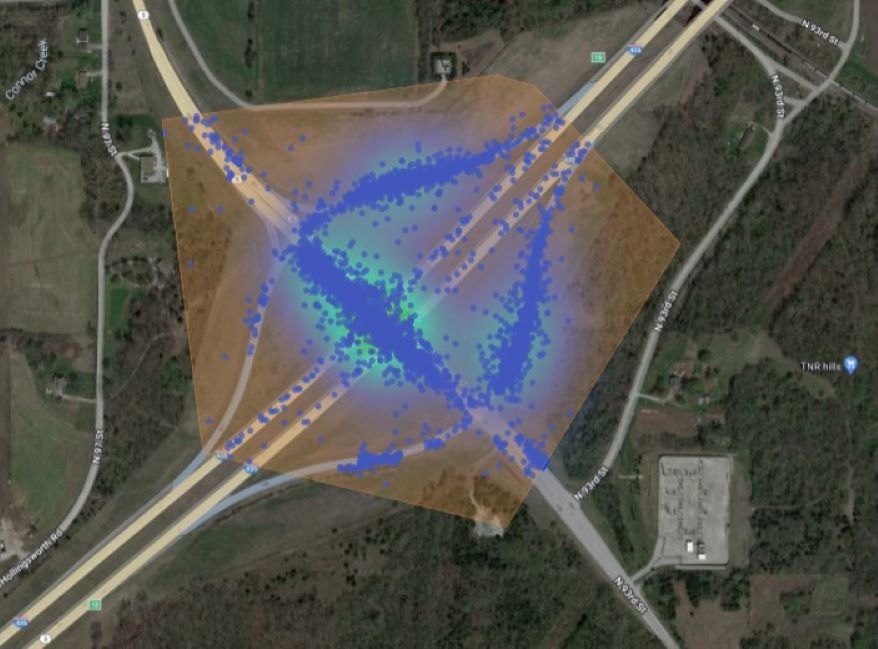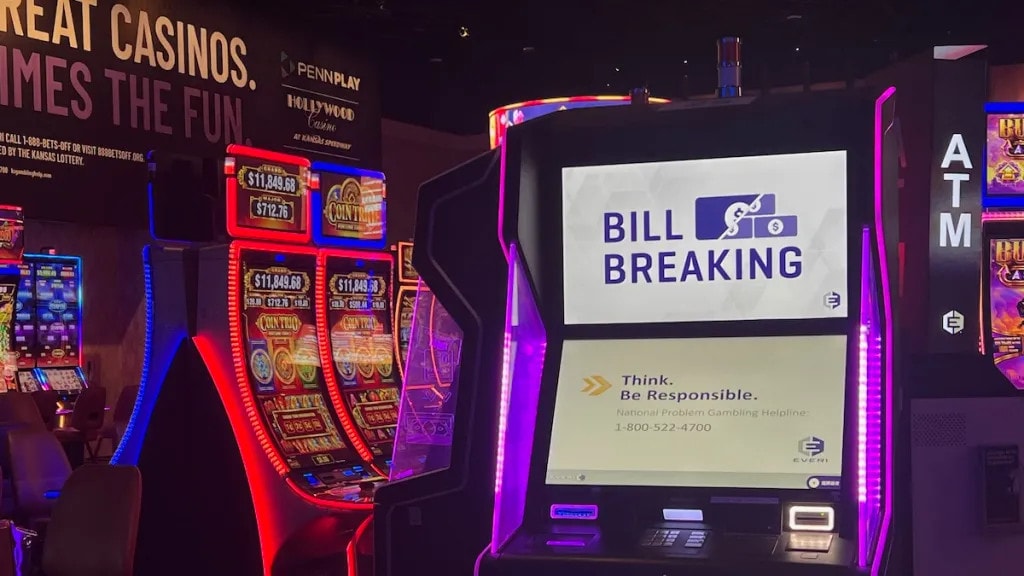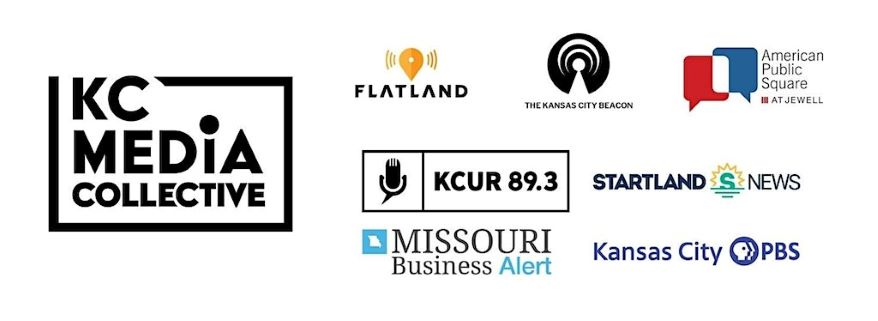With a Casino on Their Phones, More Kansas City Gamblers Risk Addiction Addiction experts warn that sports betting apps and in-game wagering pose a particularly addictive temptation that can add up to trouble for problem gamblers. Expect to see tens of millions of dollars wagered in Kansas on the Super Bowl.
Published February 9th, 2024 at 1:03 PM
Above image credit: Inside the sportsbook at Hollywood Casino at Kansas Speedway, gamblers can make sports bets. (Suzanne King | The Beacon)When Andrew Gallamore clocks out of work at his job in Bonner Springs, he clicks on his phone. Sometimes, to bet.
His DraftKings app makes dropping $5 or $10 on a prop bet so easy. And once he’s back home in Missouri, having even a few dollars riding on how many yards a player may rack up running or passing makes watching sports that much better.
“It makes the game,” he said, “way more exciting.”
His bets are among the $2.8 billion wagered in Kansas since the state legalized sports betting in September 2022. And among the $300 billion in bets placed nationwide since 2018, when the U.S. Supreme Court said every state had the right to legalize the pastime.
Casual gamblers like Gallamore use sports betting apps to add a little spice to a game. Yet for a fast-growing number of gamblers, online, in-game betting takes a potentially addictive pastime and makes it irresistible in ways that can put a mortgage, a lifetime of savings or a life in danger.

Sports betting apps like DraftKings and FanDuel that put the power to wager in your pocket, experts say, can act like a newly powerful drug laced into something familiar — sports fandom combined with the always available hope of easy money.
“It’s like gasoline on a fire,” said Keith Spare, chair of the Kansas City Port Authority Problem Gambling Fund Advisory Committee. “If you take the energy around sports and add gambling and add that to people who are at risk of becoming problem gamblers, you have a disaster rolling down the hill.”
So far, 38 states, Washington, D.C., and Puerto Rico have bought in — pushing sports betting revenues up 61% in 2022 to $7.5 billion. And the dollars won and lost on athletes figure only to grow as more states tear down legal limits. Missouri has been toying with the idea since the high court said it could.
Consider this weekend’s Super Bowl. It’s expected to draw 68 million Americans betting a combined $23 billion-plus, a whopping 35% more than in 2023. The American Gaming Association predicts that almost half of those bets will be placed online.
Kansas lawmakers legalized sports betting in 2022, and Gov. Laura Kelly, wearing a red Barstool Sportsbook jacket, placed the state’s first legal sports bet in September of that year. (She won with a homer bet: that the Chiefs would win the Super Bowl six months later.)
By the end of last year, bettors in Kansas had wagered $2.8 billion. Of that, the state made $12.2 million — or less than half of 1% of the money gambled on point spreads and over/unders.
Critics contend the state’s lawmakers failed in not giving the state a bigger share and in letting sportsbooks deduct “free plays or other promotional credits” used to draw gamblers into the habit.
Missouri lawmakers have yet to legalize sports betting, but the state is expected to join in soon. Missouri’s professional sports teams, with financial help from FanDuel and DraftKings, are leading a petition drive to place a constitutional amendment on the November ballot.
“People want to do it,” said Leon Lewis, who was being paid to collect signatures for the petition drive recently outside a midtown Kansas City grocery store. “Most of the people I speak to are aware that residents here are going to Kansas to gamble anyway.”
Though sports gambling isn’t legal in Missouri, it is already everywhere in Kansas City: On the radio, at sporting events, on highway billboards and on TV during games.
Missourians need only cross the state line to bet legally. From their phones. Often in their cars, just barely inside Kansas.
The law is clear. It’s still illegal to bet in Missouri. But Missouri residents can place sports bets in Kansas. The betting apps in their phones will only accept wagers when a phone is in Kansas.
GeoComply, a Washington, D.C.-based company, makes its money by checking that you’re actually in Kansas when you gamble on Travis Kelce’s receiving yards, points surrendered by the 49ers defense or the opening coin flip. If you’re not in Kansas, it’s the company’s job to block your bets.
Between Jan. 13 and Feb. 4, while the Chiefs made their playoff run, GeoComply conducted 2.65 million geolocation checks from more than 81,000 individual sports wager accounts located in Missouri.
The company pinpointed a single highway interchange — Exit 18 off Interstate 435 in Wyandotte County — as a notable hot spot.

While the Chiefs were winning playoff games, the company conducted 24,000 geolocation checks at that single interchange, the first one across the Missouri River from Platte County. It pinpointed 1,300 individual accounts owned by Missouri gamblers who presumably drove into Kansas, pulled off to the shoulder and made their bets.
Jason Moss plays poker at Kansas City area casinos and, occasionally, bets on sports. He’s overheard people joke about parking lots or gas stations just west of the state line that are so popular with Missouri sports gamblers, someone should bring in a food truck.
“There’s all kinds of people that pull over and do that,” said Moss, who lives in Blue Springs.
The National Council on Problem Gambling estimates that the ubiquity of sports betting, unleashed by the 2018 U.S. Supreme Court decision that struck down the Professional and Amateur Sports Protection Act, led to a 30% rise in the risk of gambling problems by 2021. And the risk has likely grown in the years since.
“The introduction of online sports betting has made every single phone a casino,” said Cait Huble, director of communications with the council. “With the increase of accessibility, the availability of it and things like in-play betting, it’s just exacerbating the risk for problems developing.”
Moss said gamblers should worry about the addictiveness of in-game betting, which he compared to going to a bar and never getting cut off. Before bets went online, wagers could only be placed before the kickoff or first pitch. Now, gamblers can chase their losses almost endlessly throughout a game.
“In-game betting,” Moss said, “is way more addictive for an impulsive person.”
A 2022 study in Missouri, funded by the Kansas City Port Authority Problem Gambling Fund Advisory Committee, found that 64% of adults in the state gamble every year, while 20% gamble at least weekly. The study, based on a sample of 3,259 people, estimated that 4% of Missourians, about 200,000 adults, met the criteria of a gambling disorder. Another 21%, about 1 million people, were at risk of the addiction. That’s almost one in 20 with a problem. Another one in five on the verge.
Health and addiction experts want to see states, which sanction gambling through lotteries, casinos and, more recently, sports betting, take greater responsibility for helping people who gamble themselves into trouble.
“I’m not aware of any state government that has the lottery equivalent of the drug or alcohol department,” Huble said.
States spent $31.8 billion on substance abuse disorders in 2021 — more than 330 times as much as the $94 million they devote to treating gambling addiction.
Of course, gambling won’t affect everyone, Spare said, but it can be life-threatening for the people who have the most serious addictions. The 2022 Missouri study concluded that 72,000 Missouri adults could be experiencing suicidal thoughts or may have attempted suicide because of their gambling.
“You can’t die from gambling at the casino or playing the lottery,” Spare said. “But the consequence leads to suicide and in some cases criminal activity, which results in death.”
Spare said problem gamblers get so engaged in gambling they steal from their kids or do most anything else to keep going. In his years counseling gambling addicts, Spare said, he had clients who took out two mortgages to fund their habit.
“The gambler,” he said, “believes they’re going to win.”
Health experts say the brain chemistry triggered by gambling is the same as an opioid, a highly addictive drug. But addictions related to gambling can be easily hidden because so many problem gamblers head down a destructive path long before anyone notices.
“We’ve got people who have hidden it from family members, from employers, for months and years before they reach a point where they can’t do it anymore,” a recovering problem gambler and volunteer who answers calls placed to the Kansas City Gamblers Anonymous hotline said.
He has seen people lose their jobs, their homes and their families. And, in the worst cases, their lives to suicide.
“Gambling is like any addiction,” he said. “It will take you down to levels you haven’t even dreamed of.”

Missouri and Kansas both funnel some gambling revenue to treating problem gambling, but experts say their efforts fall short.
In 2023, Missouri put $100,000 of the $29 million it collected from casino admissions fees into a compulsive gamblers fund. Of that, only $24,667 was paid out to contracted providers for treatment.
But Kansas spent $748,000 on its problem gambling and treatment services in 2023, up from about $530,000 the previous year.
Both states operate helplines that gamblers can call to get assistance with problem gambling. They promote those helplines at every casino and with every lottery ticket sale, but call volume is low. Missouri’s 1-888-BETS-OFF logged 1,746 calls in 2022, compared with 1,593 the previous year. Kansas’ 1-800-GAMBLER reported 377 calls in 2023, 263 in 2022 and 225 in 2021.
Both Missouri and Kansas also offer people an opportunity to be placed on voluntary exclusion lists so they will be blocked from gambling at casinos, on the lottery or on a sports app. But as sports betting grows, addiction and health experts contend, the states and the federal government need to do more.
Legislation introduced in Washington would take half of the revenue collected from the federal excise tax on gambling and put it toward helping prevent, treat and study gambling addiction. Proponents of the bill estimate the measure could bring more than $130 million to the effort in a single year.
If the ballot measure to legalize sports betting in Missouri makes it to voters and is adopted, according to proposed language, the state would only get a 10% wagering tax. But the measure would create a Compulsive Gaming Prevention Fund and specifies that 10% of annual tax revenues or $5 million, whichever is greater, would go to the fund.
The Kansas City Port Authority Advisory Committee is calling on lawmakers to be sure any sports betting laws give financial support to treatment, prevention and education; include training requirements for all industry employees to watch for and know the signs of gambling disorder; and call for advertising that accurately represents the risks of gambling.
Some in the industry already are looking internally to clean up marketing.
Earlier this year, the industry announced it was adopting a responsible marketing code. It bans sports books from partnering with colleges to promote betting, bans payments to college athletes for marketing purposes and restricts sports betting ads from saying bets are “free” or “risk-free.”
In April, major professional sports leagues and the media companies Fox and NBCUniversal announced the Coalition for Responsible Sports Betting Advertising, which calls for similar safeguards, including recommending that “excessive” advertising be avoided.
Anyone who has watched a football game this season may find that request difficult to imagine. But the NFL has said that viewers of this year’s Super Bowl should only expect three sports betting ads during the game.
Unless you check your phone.
Suzanne King Raney is a health reporter for The Beacon, where this story first appeared. The Beacon is a member of the KC Media Collective.



